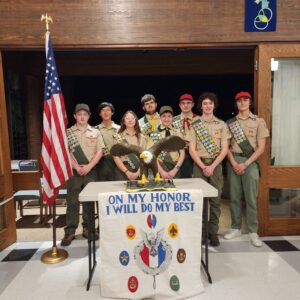
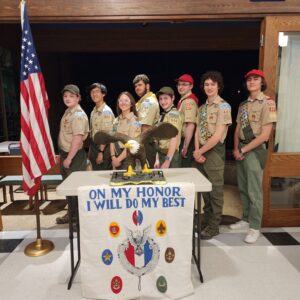
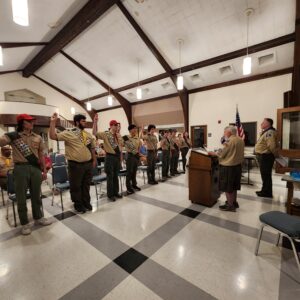
The May monthly NCAC Potomac District Eagle Board of Review for 8 Scouts was held Friday night.
Congratulations to all the new 🦅 Eagles Scouts and their proud parents, with special thanks to the Scouters, the EBOR Chairs, and those who assisted these 8 Scouts on their journey to the 🦅 Eagles rank!
Last but not least Potomac District cannot put this monthly event without the leadership and time devoted by Larry McNiece, Potomac District Eagle Chair!
。。。
http://usscouts.org/eagle/eaglecongrats.asp
https://oa-bsa.org/…/eagle-scout-congratulatory-letter
https://oa-bsa.org/resources/ucl-support/summit-award-congratulatory-letter
The Association of Top Achiever Scouts (ATAS) is a worldwide Scouting fellowship group, of Scouts and Scouters who have achieved the highest rank as a youth in their Scout associations such as King’s Scout, Queen’s Scout, President’s Scout, Fuji Scout, Tiger Scout, Eagle Scout, Summit, Quartermaster.
https://www.atasapr.org

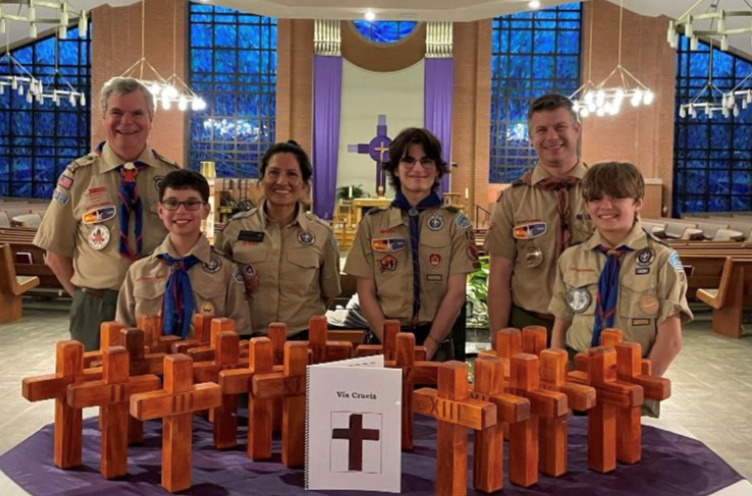
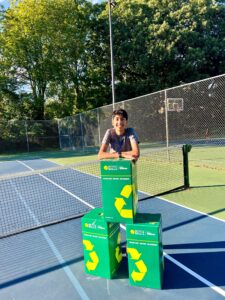
 Zane spotted a chance to reuse old tennis balls in addition to reducing waste. Zane explained, “My project is a huge success, with over 10,000 tennis balls collected and recycled. The used tennis balls are sent to Recycle Balls in Vermont and used for a variety of purposes, such as playground surfaces, sports surfaces, and pet toys. Recycle Balls is a non-profit organization in Vermont that specializes in recycling tennis balls. They have recycled over 10 million balls since 2016. Each tennis ball takes 400 years to decompose and millions of tennis balls are disposed of in landfills each year”. This Eagle Scout project not only reduced waste but also made a positive impact on the environment by keeping used tennis balls out of landfills. Zane educated over 300 individuals about recycling tennis balls.
Zane spotted a chance to reuse old tennis balls in addition to reducing waste. Zane explained, “My project is a huge success, with over 10,000 tennis balls collected and recycled. The used tennis balls are sent to Recycle Balls in Vermont and used for a variety of purposes, such as playground surfaces, sports surfaces, and pet toys. Recycle Balls is a non-profit organization in Vermont that specializes in recycling tennis balls. They have recycled over 10 million balls since 2016. Each tennis ball takes 400 years to decompose and millions of tennis balls are disposed of in landfills each year”. This Eagle Scout project not only reduced waste but also made a positive impact on the environment by keeping used tennis balls out of landfills. Zane educated over 300 individuals about recycling tennis balls.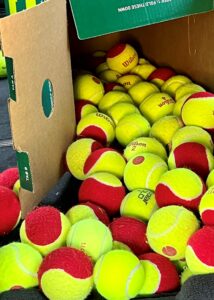 The Scout BSAs of America’s Distinguished Conservation Service Award program honors scouts who carry out significant conservation projects. The Distinguished Conservation Service Award project requirements are more rigorous than a Scout BSA Eagle Award project. To earn the award, Scouts must complete two Eagle Scout environmentally related projects. It requires the Scout to conduct in depth research of a conservation issue; determine a solution; write a report; plan, execute and lead a project; educate the community outreach; write final project reports; present their projects and findings before a conservation committee; and earn 7 conservation type merit badges.
The Scout BSAs of America’s Distinguished Conservation Service Award program honors scouts who carry out significant conservation projects. The Distinguished Conservation Service Award project requirements are more rigorous than a Scout BSA Eagle Award project. To earn the award, Scouts must complete two Eagle Scout environmentally related projects. It requires the Scout to conduct in depth research of a conservation issue; determine a solution; write a report; plan, execute and lead a project; educate the community outreach; write final project reports; present their projects and findings before a conservation committee; and earn 7 conservation type merit badges.
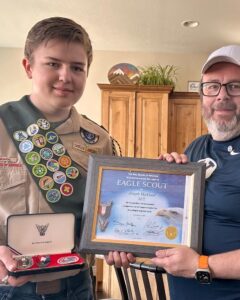 In a remarkable display of compassion and initiative, Joe Markland, a dedicated member of Troop 503, in the National Capital Area Council, based out of El Salvador, undertook an extraordinary Eagle Scout project that has touched the lives of countless families in his community. With a heartwarming mission to provide comfort during times of unimaginable loss, Joe built and donated ten meticulously crafted coffins for infants to local hospitals. This act of kindness is not only a testament to Joe’s character but also a significant step towards alleviating the hardships faced by impoverished families in El Salvador.
In a remarkable display of compassion and initiative, Joe Markland, a dedicated member of Troop 503, in the National Capital Area Council, based out of El Salvador, undertook an extraordinary Eagle Scout project that has touched the lives of countless families in his community. With a heartwarming mission to provide comfort during times of unimaginable loss, Joe built and donated ten meticulously crafted coffins for infants to local hospitals. This act of kindness is not only a testament to Joe’s character but also a significant step towards alleviating the hardships faced by impoverished families in El Salvador.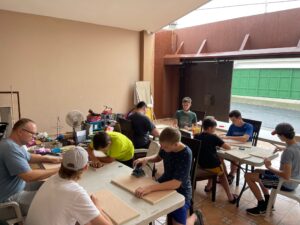
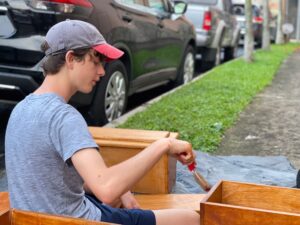
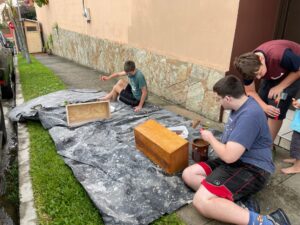 Joe’s Eagle Scout project, centered around building handmade coffins for infants and donating them to local hospitals, is a testament to his unwavering commitment to serving others. By addressing a pressing issue within his community, Joe has brought peace, comfort, and renewed hope to countless families in El Salvador. His actions exemplify the transformative power of empathy and serve as an inspiration to all, reminding us that through compassion and determination, we can make a tangible difference in the lives of others.
Joe’s Eagle Scout project, centered around building handmade coffins for infants and donating them to local hospitals, is a testament to his unwavering commitment to serving others. By addressing a pressing issue within his community, Joe has brought peace, comfort, and renewed hope to countless families in El Salvador. His actions exemplify the transformative power of empathy and serve as an inspiration to all, reminding us that through compassion and determination, we can make a tangible difference in the lives of others.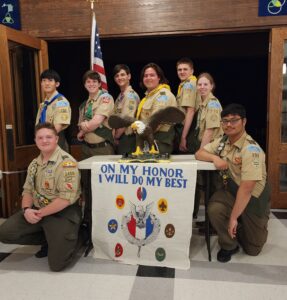 NCAC’s Potomac District held its monthly Eagle Board of Review this week, welcoming eight new Eagle Scouts!
NCAC’s Potomac District held its monthly Eagle Board of Review this week, welcoming eight new Eagle Scouts!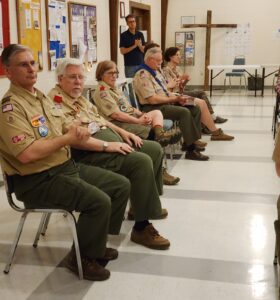
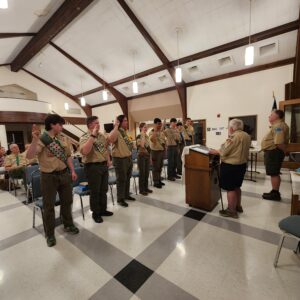
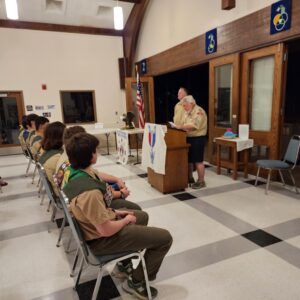
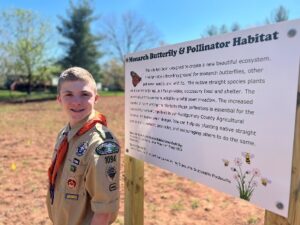
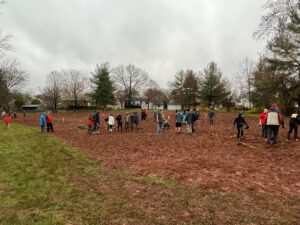 In order to make a significant impact on the environment, I knew I needed to create a large project. I needed at least ½ acre piece of land from the town. First, I had to present my idea to the Town of Poolesville Parks and Recreation Board. They agreed that my idea was a good one and recommended I present my idea to the Town of Poolesville Commissioners at one of their public meetings. Thankfully, the Town Commissioners really liked my initial proposal. They agreed to grant me a ½ acre piece of land and gave me a budget of $6,000 for pollinator plants.
In order to make a significant impact on the environment, I knew I needed to create a large project. I needed at least ½ acre piece of land from the town. First, I had to present my idea to the Town of Poolesville Parks and Recreation Board. They agreed that my idea was a good one and recommended I present my idea to the Town of Poolesville Commissioners at one of their public meetings. Thankfully, the Town Commissioners really liked my initial proposal. They agreed to grant me a ½ acre piece of land and gave me a budget of $6,000 for pollinator plants.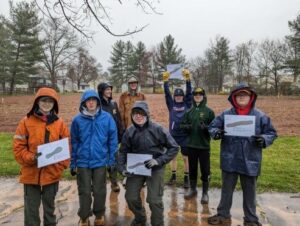 I worked with a local landscape company called Fine Earth Landscape. They helped me design seven gardens that would contain 391 native straight species pollinator plants. These plants were one gallon in size. There were 12 different varieties which included two types of milkweed and colorful plants like Lobelia Cardinalis which attracts hummingbirds. A field of native wildflower seeds would then surround the seven gardens. The idea is to have the ½ acre filled with native straight species pollinator plants. It will take a few years to completely fill in the seven gardens and the wildflower meadow.
I worked with a local landscape company called Fine Earth Landscape. They helped me design seven gardens that would contain 391 native straight species pollinator plants. These plants were one gallon in size. There were 12 different varieties which included two types of milkweed and colorful plants like Lobelia Cardinalis which attracts hummingbirds. A field of native wildflower seeds would then surround the seven gardens. The idea is to have the ½ acre filled with native straight species pollinator plants. It will take a few years to completely fill in the seven gardens and the wildflower meadow.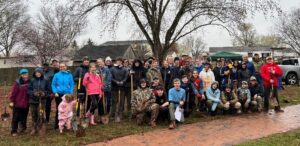 My project day was March 25, 2023, and it rained – A LOT! The entire area became a giant mud pit. I put a message out to everyone I recruited that this event would be rain or shine. I anticipated just a few of my fellow Troop Scouts showing up to help me with my parents. I was so surprised that 60 volunteers arrived to help plant the habitat despite the rain! Thanks to all of their help we had this habitat planted in two hours just when the rain stopped. Everyone was covered in mud but everyone said they had a lot of fun. I was nervous when so many people showed up however, it became a really easy project to lead. I think my success was a result of all my hard pre-planning. Everyone literally went straight to work digging holes and placing the plants in the ground.
My project day was March 25, 2023, and it rained – A LOT! The entire area became a giant mud pit. I put a message out to everyone I recruited that this event would be rain or shine. I anticipated just a few of my fellow Troop Scouts showing up to help me with my parents. I was so surprised that 60 volunteers arrived to help plant the habitat despite the rain! Thanks to all of their help we had this habitat planted in two hours just when the rain stopped. Everyone was covered in mud but everyone said they had a lot of fun. I was nervous when so many people showed up however, it became a really easy project to lead. I think my success was a result of all my hard pre-planning. Everyone literally went straight to work digging holes and placing the plants in the ground.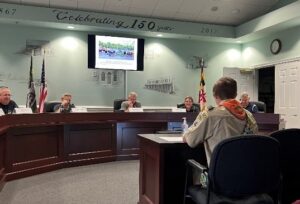 I am really flattered that so many in the community are excited about this project and that they are so supportive.
I am really flattered that so many in the community are excited about this project and that they are so supportive.